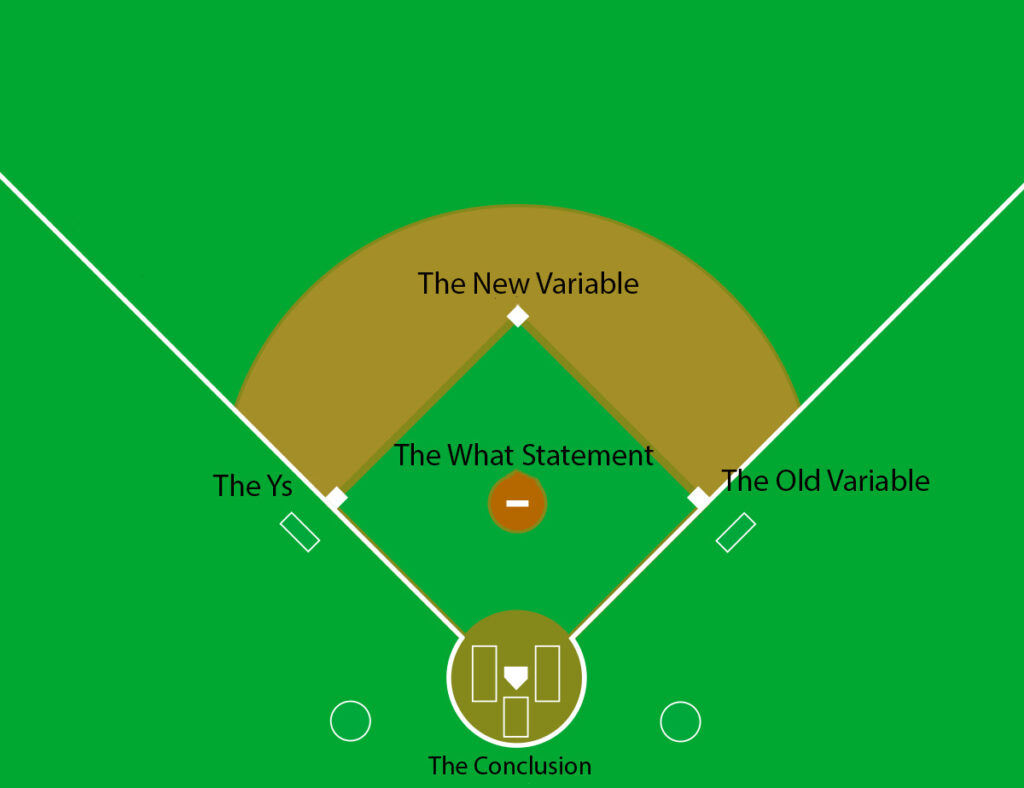LESSON 2.22
Writing the Old Section of
an Academic Paper
 Think of your paper as a baseball diamond.
Think of your paper as a baseball diamond.
The What Statement is at home plate.
The Old Variable is first base.
The New Variable is second base
The Ys are third base
The Conclusion is home base.
It is important that you cover ONLY each base’s part.
For example, pretend you were writing a research paper based on this What Statement:
Ouabain may cause hypertension because it triggers erratic heart contractions and interferes with sodium calcium transfer.
Old variable: hypertension
New variable: ouabain
Y1: it triggers erratic heart contractions
Y2: it interferes with sodium calcium transfer
On first base you will cover only hypertension. That’s because first base is the Old section. You will say nothing about ouabain or about either Y.
Structure of the Old Section
A section can be as long or as short as you wish. But it must contain these three parts:
Introduce by making a Claim
Hypertension is the world’s number one risk factor for death.
Define, describe, and/or discuss the Claim
Also known as high blood pressure, it occurs when the pressure in the blood vessels is higher than 140/90 mmHg. The first number refers to the pressure in blood vessels with the heart contracts – that is, when it beats. The second number refers to the pressure in blood vessels when the heart rests – that is, between beats.
Provide evidence that the Claim is true.
About one in four men and one in five women have the illness. As of 2015, approximately 1.28 billion people age 30-79 had it. Up from 594 million just ten years earlier. Two-thirds of the sufferers live in low- to middle-income countries. Africa has the highest prevalence, with 27%, whereas the Americas have the lowest, with 18%.
Untreated, hypertension can cause kidney disease, heart disease, and stroke, among several other illnesses.
The Length of a Section
A section – that is, the Old, the New, and each Y – can be any number of paragraphs, as long as they stay on the subject.
You can run the IDP parts together if you wish. For instance, the above paragraphs could be reduced to one or two:
Hypertension is the world’s number one risk factor for death. Also known as high blood pressure, it occurs when the pressure in the blood vessels is higher than 140/90 mmHg. The first number refers to the pressure in blood vessels with the heart contracts – that is, when it beats. The second number refers to the pressure in blood vessels when the heart rests – that is, between beats. As of 2015, approximately 1.28 billion people age 30-79 had hypertension, including one in four men and one in five women. Up from 594 million just ten years earlier. Two-thirds of the sufferers live in low- to middle-income countries. Africa has the highest prevalence, with 27%, whereas the Americas have the lowest, with 18%. Untreated, hypertension can cause kidney disease, heart disease, and stroke, among several other illnesses.
Having two paragraphs of this Old section is more readable:
Hypertension is the world’s number one risk factor for death. Also known as high blood pressure, it occurs when the pressure in the blood vessels is higher than 140/90 mmHg. The first number refers to the pressure in blood vessels with the heart contracts – that is, when it beats. The second number refers to the pressure in blood vessels when the heart rests – that is, between beats.
As of 2015, approximately 1.28 billion people age 30-79 had hypertension, including one in four men and one in five women. Up from 594 million just ten years earlier. Two-thirds of the sufferers live in low- to middle-income countries. Africa has the highest prevalence, with 27%, whereas the Americas have the lowest, with 18%. Untreated, hypertension can cause kidney disease, heart disease, and stroke, among several other illnesses.
Small-Group Activity
1
1
1
1
1
1
Individual or Small-Group Activity
Complete the exercise: Nunavut